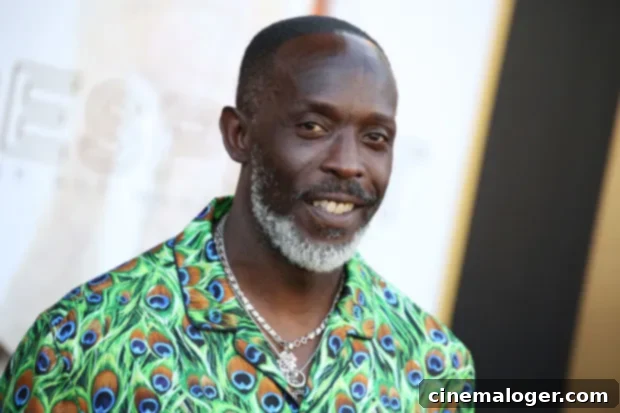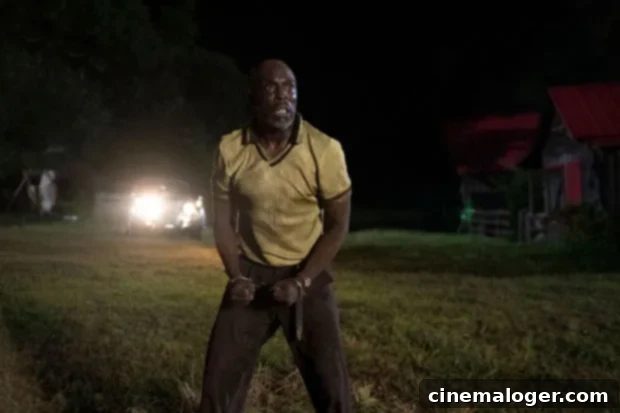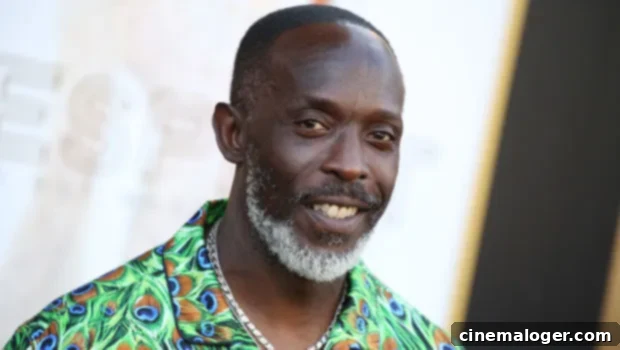Remembering Michael K. Williams: A Tribute to an Iconic Actor and His Enduring Legacy
The world of entertainment suffered a profound loss on September 6, 2021, with the passing of the immensely talented actor, Michael K. Williams. At just 54 years old, Williams left an indelible mark on television and film, captivating audiences with his raw authenticity, profound vulnerability, and extraordinary range. His sudden death, confirmed by police to HollywoodLife, sent shockwaves through Hollywood and among his legions of fans who admired not only his craft but also his candidness about life’s challenges.
Authorities discovered Williams deceased in his living room at his residence in New York City. Lt. John Grimpel of the NYP’s Media Relations Department stated via email, “We responded to his residence at 440 Kent Ave. at 2pm. He was found deceased in his living room. The medical examiner will determine the cause of death.” While the specific circumstances surrounding his passing were under investigation, the immediate focus shifted to celebrating the life and career of a man who transcended typical character portrayals, bringing a unique blend of menace and humanity to every role he embodied.
Williams’s legacy is vast and varied, characterized by his ability to inhabit complex, often morally ambiguous characters with a depth that made them relatable and unforgettable. From his breakout role as Omar Little to his later acclaimed performances, he consistently pushed boundaries, earning critical praise and numerous accolades. This article delves into the remarkable life and career of Michael K. Williams, exploring the iconic roles that defined him, his personal journey, and the lasting impact he leaves on the art of acting.
The Unforgettable Omar Little: Michael K. Williams on ‘The Wire’
Michael K. Williams rose to international prominence for his groundbreaking portrayal of Omar Little on HBO’s critically acclaimed series, The Wire. From 2002 to 2008, Williams breathed life into one of television’s most compelling and unconventional characters. Omar Little was a notorious “stick-up man” in the gritty streets of Baltimore, known for robbing drug dealers. However, Williams’s performance transformed a potentially one-dimensional character into a complex figure defined by his strict moral code, unexpected compassion, and undeniable charisma. Omar was openly gay, a rarity for a formidable street criminal character, and this aspect was handled with dignity and nuance, further breaking down stereotypes in mainstream television.
Williams often reflected on the profound impact Omar had on his own life and on popular culture. He famously described Omar as a modern-day Robin Hood, and his catchphrases, like “Omar comin’!” became iconic. His portrayal was lauded for its authenticity and depth, earning him immense praise from critics and viewers alike. “Mike is a beautiful man, but a gangster he is not,” Williams once mused in 2015, highlighting the stark contrast between himself and the character, yet also acknowledging the profound connection he felt to Omar’s humanity. The character’s popularity cemented Williams’s status as a formidable talent capable of infusing even the darkest roles with empathy and layers of meaning. Omar Little remains one of television’s most beloved and groundbreaking characters, a testament to Williams’s transformative acting prowess.

Honest Reflections: Michael K. Williams on Past Drug Use and Recovery
Beyond his extraordinary talent on screen, Michael K. Williams was also known for his remarkable honesty and vulnerability, particularly regarding his past struggles with drug addiction. He courageously revealed that he battled drug use during his years on The Wire, a period many consider to be the peak of his early career. Specifically, he spoke about the challenges he faced around the second and third seasons of the show. “Around the second – more like third season of The Wire…I was on drugs, and I was in jeopardy of destroying everything that I had worked so hard for,” he confessed on NPR, laying bare the personal demons he fought while portraying one of television’s most iconic characters.
Williams often credited late Reverend Ronald Christian of Christian Love Baptist Church in Irvington, N.J., with helping him turn his life around. He recounted a pivotal moment: “And I came in those doors [at Christian Love Baptist Church], and I met a man who had never even heard of The Wire, much less watched it… He said, I’m going to go get you a Bible, man. You could keep that. And we going to spend the rest of this day.” This encounter marked a significant turning point in Williams’s journey towards recovery and sobriety. His candidness about addiction and the path to healing served as an inspiration to many, illustrating the profound strength it takes to confront personal struggles, seek help, and rebuild one’s life. His openness fostered empathy and highlighted the importance of support systems and faith in overcoming adversity, deeply informing the authenticity and compassion he brought to his diverse array of roles.
A Versatile Performer: Michael K. Williams’s Other Popular Roles
While Omar Little made him a household name, Michael K. Williams’s career was far from defined by a single character. His versatility shone through in a multitude of other popular and critically acclaimed roles across both television and film. He consistently sought out complex characters, bringing his signature blend of grit and grace to each one. This diverse body of work firmly established him as one of the most respected actors of his generation.
Following The Wire, Williams joined another HBO powerhouse, Boardwalk Empire, where he portrayed Chalky White, a formidable and charismatic leader of Atlantic City’s Black community during the Prohibition era. His performance as Chalky was just as nuanced and commanding as Omar, showcasing his ability to lead a powerful supporting narrative. Williams imbued Chalky with dignity, shrewdness, and a palpable sense of internal struggle, earning him further critical acclaim and expanding his fan base.
Another standout role came in the HBO miniseries The Night Of, where he played Freddy Knight, a menacing yet philosophical inmate who becomes a mentor to the protagonist. Williams’s performance in this role was riveting, delivering a character that was both terrifying and strangely protective, earning him one of his numerous Emmy nominations. His ability to convey deep emotional layers within seemingly hardened characters was once again on full display.
In the ABC miniseries When We Rise, Williams took on the role of gay rights activist Ken Jones, a real-life figure instrumental in the LGBTQ+ rights movement. This portrayal demonstrated his commitment to historical accuracy and his talent for embodying real people with integrity and emotional resonance. He conveyed Jones’s struggles and triumphs with profound empathy, further solidifying his reputation as an actor dedicated to powerful storytelling.
Beyond these, Williams delivered memorable performances in numerous other projects. He captivated audiences as Montrose Freeman in HBO’s horror-drama Lovecraft Country, a role that earned him his final, posthumous Emmy nomination. His work in films like Steve McQueen’s Oscar-winning 12 Years a Slave, Ben Affleck’s crime drama Gone Baby Gone, and Paul Thomas Anderson’s Inherent Vice further showcased his dramatic range. He also appeared in Ava DuVernay’s powerful miniseries When They See Us, continuing his pattern of choosing projects that tackle significant social issues and historical narratives. His roles in movies such as Assassin’s Creed and RoboCop demonstrated his capacity to engage with larger franchise productions, yet he always brought an undeniable gravitas to even the smallest parts.

From Brooklyn Streets to Global Stages: The Early Life of Michael K. Williams
Michael K. Williams was a true son of Brooklyn, New York, born on November 22, 1966. Growing up in the East Flatbush neighborhood, his formative years in the vibrant, often challenging, landscape of New York City profoundly shaped his perspective and eventually, his artistic expression. His upbringing instilled in him a resilient spirit and a deep understanding of urban life, elements that he would later channel into his incredibly authentic performances. The raw energy and diverse tapestry of Brooklyn undoubtedly informed his ability to portray characters with such genuine grit and emotional honesty.
Before he became a celebrated actor, Williams embarked on an unconventional path into the entertainment industry. He initially found his footing as a professional dancer, a career that saw him performing with music icons like Madonna and George Michael. His distinctive facial scar, which became a hallmark of his intimidating yet captivating screen presence, was the result of a bar fight on his 25th birthday, long before his acting career took off. This visible mark, far from being a hindrance, added to his unique aesthetic, making him instantly recognizable and lending an air of gravitas to his roles.
The transition from backup dancer to actor was a testament to his ambition and talent. He would often speak of the serendipitous moment when his distinct look caught the eye of legendary rapper Tupac Shakur, who cast him in his first acting role in the 1996 film Bullet. This unexpected opportunity opened the door to a new calling, allowing him to discover a medium where his life experiences, emotional depth, and imposing physicality could truly coalesce into powerful artistry. His Brooklyn roots, his experiences on the dance floor, and the hard-won lessons of his early life all converged to create the formidable and empathetic actor the world came to know and admire.
A Decorated Career: Michael K. Williams’s Emmy Nominations and Accolades
Throughout his illustrious career, Michael K. Williams garnered significant critical recognition, culminating in multiple Emmy nominations that underscored his exceptional talent. These nominations weren’t merely acknowledgments of good performances; they were a testament to his ability to consistently deliver profound, complex, and memorable portrayals that resonated deeply with audiences and critics alike. His nominations spanned a range of projects, highlighting his incredible versatility and his consistent pursuit of compelling narratives.
His first Emmy nomination came for his powerful role in the HBO film Bessie (2015), where he portrayed Jack Gee, the abusive husband of blues legend Bessie Smith. Williams’s performance was lauded for its raw intensity and emotional rawness, bringing a difficult yet pivotal character to life with unwavering authenticity. This nomination solidified his reputation as a serious dramatic actor capable of tackling challenging historical roles.
He followed this with another Emmy nod for his compelling work in the HBO miniseries The Night Of (2016). As Freddy Knight, he crafted a character that was both terrifying and complex, a figure who could command respect and fear in equal measure. This role, showcasing his masterful control over subtle nuances and menacing charm, further cemented his status as a critical darling and a consistent presence at major award ceremonies.
Most notably, Williams received his final, posthumous Emmy nomination for Outstanding Supporting Actor in a Drama Series for his breathtaking performance as Montrose Freeman in HBO’s Lovecraft Country (2020). This role was a culmination of his career’s work, portraying a deeply conflicted and tormented man grappling with his past, his sexuality, and systemic racism. His portrayal of Montrose was hailed as one of the most powerful performances of the year, showcasing his incredible depth and ability to convey immense pain and resilience. This posthumous recognition served as a poignant reminder of the incredible talent that was lost and the profound impact he had on the industry.
Beyond the Emmys, Williams’s work was celebrated across various film festivals and critic associations, consistently earning him praise for his ability to transform into his characters, making them feel real, flawed, and utterly unforgettable. His consistent nominations and wins throughout his career painted a picture of an actor who was not only dedicated to his craft but also genuinely gifted, leaving behind a legacy of performances that will continue to inspire and resonate for generations to come.
